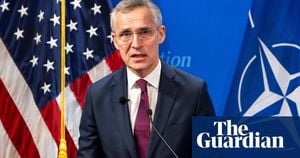South Korea is grappling with unprecedented turmoil as it finds itself plunged deep within the grips of martial law, ignited by the recent handbag scandal involving President Yoon Suk Yeol's wife, Kim Keon-hee. The alarming developments unfolded dramatically on December 3rd, when President Yoon made the shocking announcement during a late-night address, citing the need for stability amid plunging approval ratings and rising public dissent. The martial law declaration and the ensuing chaos have led many to speculate about potential treason trials facing the president, raising palpable fears about the future of democracy in South Korea.
According to Michael Madden from North Korea Leadership Watch, the political instability now rife within South Korea may prove advantageous for North Korean leader Kim Jong-un. Madden remarked, "This turmoil is almost like a gift for Kim," who can now leverage South Korea’s chaos as propaganda against his own regime. Amidst this strife, North Korea may showcase its relative stability to position itself favorably compared to its southern neighbor, asserting, "You might be hungry here but we have stability," Madden added.
The chaos escalated quickly after Yoon's unexpected martial law move, prompting elite special forces to storm the National Assembly with helicopters flying troops directly amid civic protests against his decision. The sight of soldiers clashing with lawmakers was jarring – barricades erected by parliament officials were met with elite military tactics and even fire extinguishers, as legislators desperately tried to halt what was perceived as Yoon’s blatant power grab.
Public discontent had been brewing for some time, largely ignited by the scandal surrounding Kim Keon-hee's alleged acceptance of a luxury Dior handbag worth approximately 3 million Won (around £1,800) from a Korean American pastor. This incident, revealed through covert filming, not only caught the public's ire but also triggered myriad discussions about corruption and ethical governance. The pastor claimed his actions were instructed by Voice of Seoul, a left-leaning critique platform, raising accusations of political manipulation.
Yoon’s approval ratings, having plummeted below 20 percent due to this enduring scandal, have left him fighting for credibility and control. With accusations of cover-ups and mismanagement, questions surrounding Kim's alleged involvement with stock market manipulation and dishonest propaganda have shadowed the current administration. The president attempted to reclaim some public favor with apologies, claiming the leaked video was part of politically motivated tactics against his family.
Despite the president's immediate refusal to step down during the turmoil, his brash decision for military intervention led to immediate backlash. Within hours of declaring martial law, Yoon rescinded his order, but the damage was already done. The main opposition party, the Democratic Party, has since initiated impeachment proceedings against him, stating, "Even if martial law is lifted, he cannot avoid treason charges." A senior member of parliament indicated the potential for criminal charges could lead to severe penalties with treason punishable by death under South Korean law, though executions have been halted since 1997.
Adding to the complications, South Korea's Defense Minister, Kim Yong-hyun, who reportedly advised Yoon on the martial law move, has also resigned amid rising tensions and accusations. Amidst the backdrop of public demonstrations, where large crowds chanted for Yoon's resignation, lawmaker Lee Jae-myung condemned the declaration as nothing less than "a coup against the people," reflecting the widespread sentiment among South Koreans who see this moment as pivotal not only for their governance but also for the direction of their civil rights.
The gravity of martial law cannot be overstated. Usually reserved for periods of war or significant crises, it permits military intervention and suspension of civil liberties. Historically, various nations have resorted to such drastic measures to quell dissent or political instability, but the concept is laden with risks, especially concerning the potential displacement of democratic norms. Protests are now widespread, reclaiming streets across South Korea as citizens express their outrage against perceived governmental overreach.
While Kim's alleged actions are under scrutiny, it's the broader question of political accountability and stability within South Korea that's raising eyebrows internationally. Observers worry about the precedent this incident may set for future governance, should the current administration exploit such controversies to entrench its power. Amidst all of this, Yoon's administration seems to be losing grip on the narrative, with opposition forces hungry to reclaim authority and public trust displayed through relentless demonstrations.
With the military's takeover of civilian governance now officially retracted, the pressure mounts for Yoon to navigate through these turbulent waters. The looming threat of impeachment reflects growing dissatisfaction not only with the president's response to political crises but also with long-standing issues of corruption and misalignment with the populace's interests.
For South Koreans, the time is now for civic engagement, as they contemplate the future of their nation under leaders implicated in scandal. Questions over true governance versus authoritarian rule remain at the forefront, leaving many worried about the preservation of their democracy amid troubling socio-political battles.
At this crossroads, the South Korean populace is forced to reckon with the return of martial law and its possible ramifications for civil rights. With lessons from history echoing through these actions of military governance, citizens remain vigilant against potential encroachments on their hard-won liberties.
Looking forward, as the martial law decree dissipates, the onus lies on the government to rectify its reputation and restore public confidence. The path will not be easy—trust once shaken takes time to rebuild. South Korea remains at the precipice, caught between its political past and what will inevitably shape its future.



